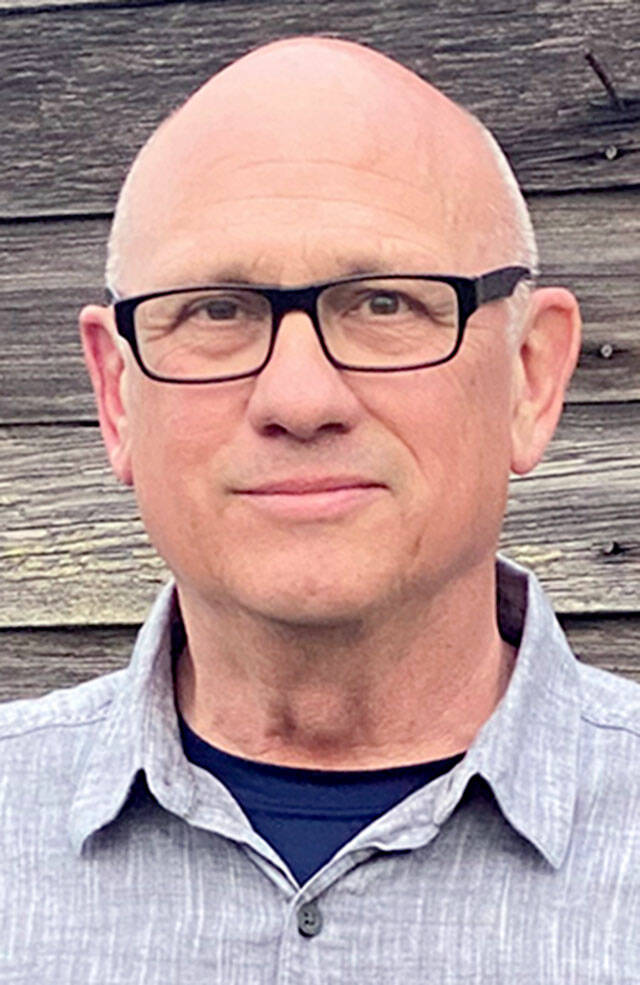PORT ANGELES — Interaction with ratepayers and alternative energy, including the region’s hydroelectric system, were two of the topics raised during an often contentious debate between incumbent Will Purser and challenger Ken Hays for a seat on the Clallam County Public Utility District board of directors.
The Wednesday night forum was part of a series hosted by the League of Women Voters of Clallam County (LWVCLA) and the North Olympic Library System (NOLS).
Purser and Hays are vying for the seat in the Nov. 8 general election. Ballots in the all-mail election will be sent out Oct. 19.
Several questions dealt with how the district’s board and employees interact with ratepayers.
Hays said, “I think it’s important that we listen to the ratepayers and customers. The board has a reputation that they are indifferent. We need active and aggressive engagement.
“It takes a lot of effort. We need to take the meetings to the ratepayers. We need to take them to the districts and cities and engage other organizations in county.”
Purser responded, “We have never refused to meet with any organization. We publish our agenda. We actually have tabled issues to give the public notification.
“We reached out on our strategic plan and gave people two weeks. I’m not aware of any time when we didn’t give sufficient notification. As far as taking our meetings on the road, we’ve done that.”
Purser responded to a similar question by saying the board continues to “up our game” by conducting roadshows to get more ratepayer participation in meetings and they began recording their meetings a few years ago.
“We have two agenda items for public comment. We’ve done quite a bit. It’s working well,” he said.
Hays said, “You have to actually want to listen to what the public wants to say. You can’t wait for them to come to you. You need active and aggressive engagement.
“He’s been here 20 years and he thinks now is the time to start?” Hays said.
“It takes a significant and broad-ranging effort. Whether it’s the reactor or broadband or water system, these are critical decisions that need to be customer-driven. They have to go to the people,” he said.
Hays said he thought the district’s customer interaction was “quite sterile” and many people had approached him with that same concern.
“They have this incredibly expensive building that’s not open to the public. They need to open up their buildings and answer the phones. It’s absolutely essential. The staff is dedicated, but the leadership is not there.”
Purser said the PUD headquarters lobby is open now and that staff is following the county health department guidelines. Every time in the past the office was opened to the public, there was a spike in COVID cases, he said.
People have been working from home and the PUD has experienced what other organizations have: People don’t want to come back to an office, Purser said.
The commissioners have brought that issue to management staff and have been assured they are addressing it, he said.
In 2019, the state Legislature passed the Clean Energy Transformation Act (CETA). It requires all electric utilities in the state to shift to carbon-neutral electricity by 2030 and to 100 percent carbon-free electricity by 2045.
Purser said the PUD currently is served by 80 percent carbon-free power and is on track to meet that 2030 mandate. Hydroelectricity is renewable energy and the PUD is working with the Bonneville Power Administration (BPA) to provide more carbon-free energy, he said.
The PUD was created to take advantage of the low-cost hydroelectric system, Purser said. It is problematic to produce all the county’s electricity here, he said.
Hays responded: “It’s important to be aware that by 2050 electricity demand is expected to double. Hydro is providing 85 percent of our electricity now, and that could drop to 35 percent.
“We need a full and diverse portfolio, including rooftop solar, wind, microgrids,” Hays said.
“We need to be vigilant and not get into everyone’s way. We are highly vulnerable. It’s not really an option. It is something we must do,” he said.
Purser said the PUD has a diverse energy portfolio, including nuclear, hydro, wind and solar.
“Independent? We are looking at a regional transmission authority. That’s the way it is moving. Diversity is good, but our plan is distribution batteries, which is micro grid, including green hydrogen,” he said.
________
Reporter Brian Gawley can be reached at brian.gawley@soundpublishing.com.

